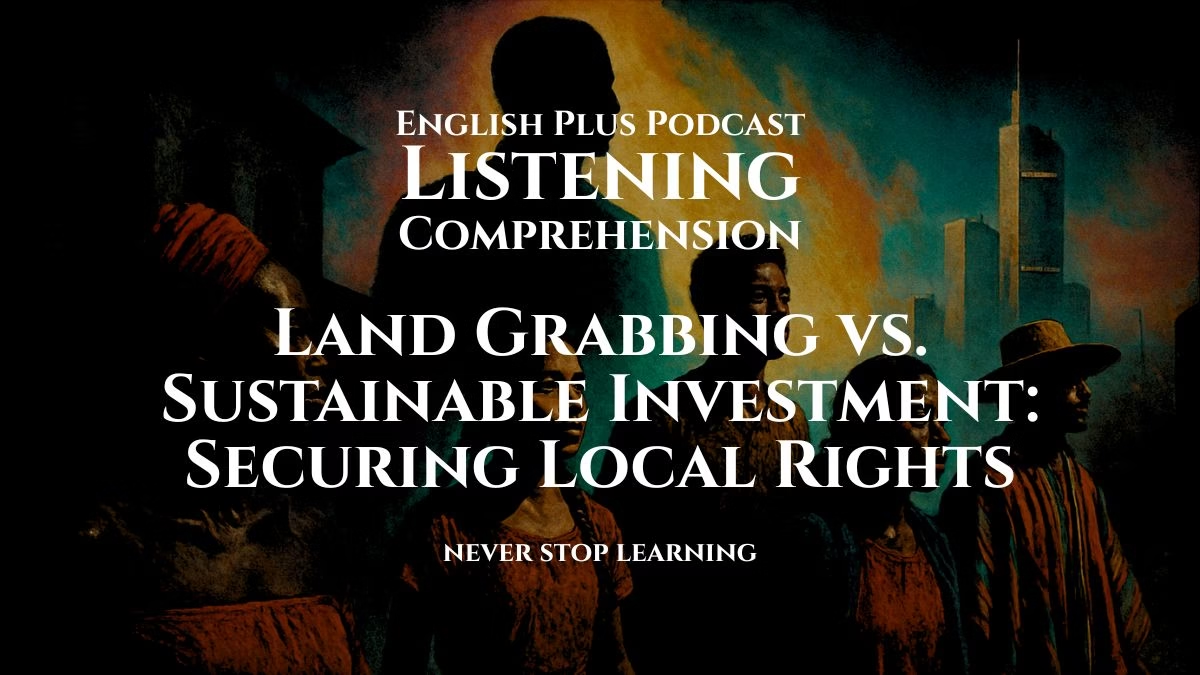Listening Skills for Exam Success
Welcome to this advanced listening practice. The lecture you are about to hear deals with a complex global issue, presenting a problem, a “gray area,” and a set of solutions. This is a very common structure in academic talks and on exams.
Here are some tips to help you navigate this lecture:
- Listen for the Pivot: The speaker will first define the problem (“land grabbing”) and then will “pivot” (using words like “However,” or “But is this the full story?”) to discuss the solutions (“sustainable investment”). Your main job is to identify this turning point in the argument.
- Use a T-Chart for Notes: On your note paper, draw a “T” shape. On the left side, list the negative impacts (the “Problem”). On the right side, list the positive alternatives (the “Solutions”). This will help you organize the information as you hear it.
- Don’t Get Lost in the Jargon: The speaker will use specific terms like “land tenure” and “FPIC.” Don’t panic if you miss the exact definition. Listen to the example or the context that follows. The speaker will almost always explain a difficult term right after saying it.
- Identify the Speaker’s Purpose: The speaker is not just listing facts; they are building an argument. Ask yourself: What is the speaker’s final message? Are they against all foreign investment, or are they arguing for a better kind of investment? This is the main idea you need to find.
Topic Introduction
You are about to hear a lecture about a controversial topic: large-scale foreign investment in agricultural land, often in developing countries.
As you listen, think about this central question: When a foreign company buys millions of acres of farmland, is it always “exploitation”? Or can it be a form of “investment” that benefits everyone involved? This lecture explores how to tell the difference and what is needed to “find the right path.”
Key Vocabulary and Phrases
Here are 12 key terms and phrases from the lecture. Understanding their meaning in this context is essential for following the main argument.
Phenomenon (n.): A situation, event, or trend that is observed to exist, especially one that is complex and being studied.
How it’s used: The speaker refers to “large-scale land acquisition” as a “global phenomenon,” meaning it’s a widespread and complex issue that deserves serious study.
Acquisition (n.): The act of gaining or getting possession of something; in this context, the purchase of land.
How it’s used: The lecture is about “large-scale land acquisition,” which is the formal, neutral term for the land deals being discussed.
Arable (adj.): (Describing land) suitable for growing crops.
How it’s used: The speaker points out that the land being bought is often the most valuable “arable land,” which is why it’s a problem for local farmers who depend on it.
Exploitation (n.): The act of treating someone unfairly in order to benefit from their work or resources.
How it’s used: The “land grab” side of the argument views these deals as pure exploitation, where investors profit while local communities are harmed.
Displacement (n.): The action of forcing people to move from their home or original place.
How it’s used: A major negative impact discussed is the displacement of entire communities that have farmed the land for generations but lack formal deeds.
Land tenure (n. phrase): The set of rules, rights, and customs that determine how a person or group can own, use, and manage land.
How it’s used: The lecture highlights a key conflict: the “customary land tenure” (traditional rights) of local farmers is often ignored because they don’t have a formal, legal title to their land.
Food security (n. phrase): The state of having reliable access to a sufficient quantity of affordable, nutritious food.
How it’s used: The speaker explains that local food security is threatened when a country’s best land is used to grow crops for export (like biofuels), not to feed the local population.
Sovereignty (n.): The supreme authority or power of a state to govern itself and its resources.
How it’s used: The issue is linked to national sovereignty, as these large deals raise questions about a country’s control over its own land and food supply.
Legal framework (n. phrase): A set of laws, rules, and regulations that provide the structure for a particular system.
How it’s used: A primary solution mentioned is the need for a strong legal framework to protect local farmers’ rights before any deal is signed.
Marginalization (n.): The process of making a group of people feel unimportant, powerless, or pushed to the “margins” of society.
How it’s used: The speaker warns that without protection, these deals can lead to the further marginalization of already vulnerable groups, like indigenous communities.
Transparency (n.): The quality of being open, honest, and easy to understand; a lack of secrecy.
How it’s used: A major solution is to demand transparency in all land deals. This means contracts must be public, not secret, so everyone knows the terms.
Stakeholder (n.): A person, group, or organization that has an interest or concern in a project.
How it’s used: The lecture concludes that a sustainable investment must involve all stakeholders—especially the local community—in the planning and decision-making process.
Listening Audio
Listening Transcript: Please do not read the transcript before you listen and answer the questions.
Over the last two decades, a quiet but massive shift has been occurring in the global south. It’s a phenomenon that has been given many names, but the most common one in the media is “land grabbing.” We are talking about large-scale land acquisition, or LSLAs: the purchase or long-term lease of vast tracts of arable land in developing countries by foreign entities. These entities can be private corporations, investment funds, or even foreign governments.
This trend accelerated dramatically after the 2007-2008 global food and financial crises. Wealthier, resource-scarce nations began to see foreign land as a strategic investment to secure their own food and energy supplies. This has led to deals involving millions of hectares of land across Africa, Southeast Asia, and Latin America.
The central question, and the one I want to explore today, is this: Is this phenomenon a modern form of colonialism—a “land grab” that leads to exploitation? Or is it a legitimate form of “sustainable investment” that can bring much-needed capital to rural communities?
Let’s first examine the “land grab” argument, which is built on a foundation of severe negative impacts. The most immediate and devastating of these is human displacement. In many of these regions, communities have lived on and farmed the same land for centuries. However, they often do so under “customary land tenure” systems, meaning their right to the land is based on tradition and community recognition, not on a formal, government-issued piece of paper.
When an investor arrives and negotiates with a central government, these customary rights are frequently ignored. The government, eager for foreign capital, signs a deal that effectively sells or leases the land right out from under the people living on it. This leads to mass evictions, the loss of livelihoods, and the marginalization of already vulnerable populations.
The second major criticism concerns food security. This is a bitter irony. These large-scale acquisitions are often concentrated in countries that suffer from high rates of hunger and malnutrition. But the land, the most productive arable land, is not used to feed the local population. It is used as a global factory farm—to grow export-oriented cash crops, such as palm oil, sugar cane for biofuels, or feed for livestock in the investor’s home country. In short: food is exported while locals go hungry, which can undermine the very sovereignty of the nation.
Finally, the “land grab” model is defined by its lack of transparency. Deals are often struck in secret between elites and investors. The contracts are not made public, and the local communities—the primary stakeholders—are neither consulted nor informed. They simply wake up one day to find their common lands bulldozed. This is the classic “exploitation” model: a top-down, non-transparent process where value is extracted and local rights are extinguished.
Now, this is a very grim picture. And in many cases, it is an accurate one. However, it is not the only possible picture.
The challenge is that many developing nations are, in fact, “capital-poor” and “land-rich.” They do need investment to develop their agricultural sectors, which are often characterized by low productivity and a lack of access to modern technology, credit, and markets. Blocking all foreign investment could mean stagnating in poverty.
So, the critical question is not “how do we stop investment?” but “how do we transform it from a ‘land grab’ into a sustainable partnership?” This is where we find the right path, and it is built on three pillars.
The first, and most important, is the creation of a robust legal framework. A government must do its homework before inviting investment. This framework’s primary job is to legally recognize and protect customary land tenure. It must formalize the rights of the people who are already using the land, so they cannot be dismissed as “squatters.”
Crucially, this legal framework must mandate what is known as “Free, Prior, and Informed Consent,” or FPIC. This is a principle from international human rights law. “Free” means the consent is given without coercion. “Prior” means it is given before any deal is signed or project begins. And “Informed” means the community receives all the information—in their own language, in a way they understand—about the full range of the project’s potential impacts, both good and bad. FPIC is not just a “meeting”; it is a genuine process of giving the community the right to say no.
The second pillar is transparency. All land contracts must be publicly disclosed. This allows journalists, civil society, and the public to scrutinize the deals. It prevents corruption and holds both the government and the investor accountable to the promises they make. This is “due diligence” for the entire society.
The third and most innovative pillar is the shift in business models—moving away from a model of displacement and toward one of community inclusion.
The old model was based on the company owning 100% of the land and, perhaps, hiring the displaced farmers as low-wage, seasonal laborers. This is not development.
The new, sustainable models look completely different. One is the “outgrower scheme.” In this model, the company doesn’t buy the farmers’ land. Instead, the farmers keep their land. The company provides them with training, high-quality seeds, fertilizer, and a guaranteed contract to purchase their crops at a fair price. The company gets the produce it needs, and the farmers become more productive, increase their incomes, and remain independent landowners.
An even more powerful model is the “joint venture,” or community-ownership model. In this setup, the community’s land is not sold; it is treated as their equity—their contribution to the partnership. The community becomes a part-owner of the project. They don’t just get a wage; they get a share of the profits. They get a seat on the board. They are no longer just stakeholders; they are shareholders.
In conclusion, the line between a “land grab” and “sustainable investment” is not blurry; it is sharp, and it is defined by process and outcomes. A “land grab” is defined by secrecy, exclusion, and the exploitation of weak laws. A “sustainable investment” is defined by transparency, inclusion, and a legal framework that respects human rights, including Free, Prior, and Informed Consent. The future of global agriculture does not have to be a battle between big capital and small farmers. By building these new models of partnership, it is possible to create a system that fosters development, respects local sovereignty, and ensures that the people who have stewarded the land for generations are the first to benefit from its new potential.










0 Comments